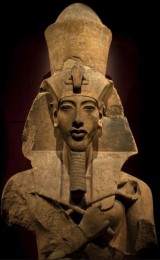 出埃及記第三課:摩西與法老:出埃及記 4:18-7:13
出埃及記第三課:摩西與法老:出埃及記 4:18-7:13
摩西是《聖經》里的重要人物之一。也許以下的問題會讓您認識他更深。
一。出埃及記4:18-20:摩西尊重岳父__ __ 對他有禮貌,請他讓他回哪裡?摩西沒有告訴岳父神給了他什麼使命,算不算向岳父撒謊?新約《聖經》要求基督徒要說實話, 但(除非在法院)它不要求我們把“全部”故事說出來。
二。出埃及記4:21-23:《聖經》第一次把以色列民族形容為神的長 __。請注意:神早宣布告訴法老他要__ __法老的兒子。(在另外一個課程里,我們會討論神所說的一句話: “我要使埃及王的心剛硬” ——4:21。)
三。出埃及記4:24-26:神會殺死摩西嗎?摩西還沒有為兒子行__ __。神為以色列人所撿選、所預定的領袖(摩西)不可以忽略此“與神立約”的記號。 (參看創世記17:9-14。)
四。出埃及記4:27-31:摩西和亞倫第一次與以色列的長老聚集,長老們__ __摩西的話;他們就向神__ __。請背誦31節:“ 百姓就信了。以色列人聽見耶和華眷顧他們,鑒察他們的困苦,就低頭下拜”。
五。出埃及記5:1-23:請述說摩西、亞倫和法老的第一次對抗。
六。出埃及記5:1-23:法老為什麼輕視耶和華神?因為它還沒有見到耶和華神的___ ___。法老認為,如果希伯來人都是他的奴僕,他們的神的能力也不會太強,否則他們不會那樣吃苦。他們為什麼要求法老給他們三天時間去曠野敬拜神?法老不但不讓他們去,他頒布了新的命令是什麼?因此,領班們對摩西怎麼樣?摩西既得知做希伯來人的領袖是很___,他又發現神的時 ___表和人的___ 間表不一樣(23節)。
 七 。出埃及記6:1-30:請述說神怎麼樣讓摩西知道他要拯救以色列人。從第12節和第30節我們可知摩西講話還是怎麼樣的人(有什麼問題)?神用什麼方法堅定摩西的信心?為了鼓勵摩西、為了表達他的權威,神時常說一句話,是什麼?
七 。出埃及記6:1-30:請述說神怎麼樣讓摩西知道他要拯救以色列人。從第12節和第30節我們可知摩西講話還是怎麼樣的人(有什麼問題)?神用什麼方法堅定摩西的信心?為了鼓勵摩西、為了表達他的權威,神時常說一句話,是什麼?
八。出埃及記6:2-3:創世記提到“耶和華”一詞幾次(譬如,創世記12:1)。為什麼出埃及記6:2-3記載說…
和合本:…我從前向亞伯拉罕、以撒、雅各顯現為全能的神,至於我名耶和華,他們未曾知道。
新譯本:…我曾向亞伯拉罕、以撒、雅各顯現為全能的上帝,至於我的名字『耶和華』,他們是不認識的。
普通話本:…我曾向亞伯拉罕、以撒和雅各顯現為伊爾什旦(全能的上帝),但從未讓他們知道我的名字是耶和華。
在舊約《聖經》里,“知道”(希伯來文)的意思是“深刻的理解”的意思;是“經驗過”的意思。所以,出埃及記6:2-3意思是他們未曾經驗過耶和華神的能力。以色列人離開埃及之前,以色列人,埃及人和埃及的王都要經歷耶和華神的力量。之後,他們都會知道耶和華是誰!他們不會再懷疑耶和華是否有能力!
九。出埃及記6:4-12:神重複他在過去所給祖先的“約”;要點是什麼?請注意摩西所提出的三個動詞:立(立約:6:4),聽(聽到哀聲:6:5),記念(記念我的約:6:5)。但,希伯來人的反應如何?
十。出埃及記7:1:摩西怎麼會代替神?請注意以下的《聖經》版本:
和合本:耶和華對摩西說:”我使你在法老面前代替神,你的哥哥亞倫是替你說話的。
新譯本:…看哪,我使你在法老面前好象上帝一樣…
普通話本:…我將使你在國王的面前如同神明…
這句話是什麼意思? 意思是神不會讓摩西,像以前一樣,在法老面前羞辱(出埃及記5章)。神要讓摩西在法老王面前有神的權威,所以摩西從神受權代表神說話,行神跡等。
十一。出埃及記7:3:神怎麼會讓法老王的心剛硬?請注意以下的《聖經》版本:
和合本:我要使法老的心剛硬…
新譯本:我要使法老心硬…
普通話本:我會使國王頑固不化…
藉著神的大能——就是摩西將要行的神跡——以色列人的心會軟化,但是王的心只會剛硬(Clyde Woods)。 NIV Study Bible (s.v. Ex. 4:21) 註明《聖經》記載說神使得法老心剛硬(九次);又說法老使得自己心剛硬(九次)。
讀者:歡迎您把這篇短文下載,複印,用在您的《聖經》班裡。
Exodus Lesson Three: Moses and Pharoah
Exodus 4:18-7:13
1. Ex. 4:18-20: Moses showed his father-in-law due respect and asked permission to ____. In not telling Jethro about the mission God gave him, did Moses lie? ___ The New Testament demands that Christians speak truth honestly but does not require that we tell the entire story (except in a court of law).
2. Ex. 4:21-23: This is the first time in Scripture that the Israelites as an ethnic group are called “my __ __.” Note that early on God told pharaoh that he would ___ his son. (In another lesson we will discuss God’s statement in 4:21, “I will harden the heart of the king of Egypt…”)
3. Ex. 4:24-26: Would God really kill Moses? ___ Moses had not yet ____ his son. The leader that God had chosen for the Israelites must not neglect this sign of their covenant with God (see Gen. 17:9-14).
4. Ex. 4:27-31: The first time Moses and Aaron met with the Israelite elders, the elders ____ Moses, and they all ___ ___. Memorize v. 31.
5. Ex. 5:1-23: Describe the first confrontation between Moses, Aaron and pharaoh.
6. Ex. 5:1-23: Why did pharaoh belittle the God of the Hebrews? (Pharaoh probably thought that since the Hebrews were his slaves, their God had only very little power, otherwise they would not be slaves.) Why did they ask for three days time to go worship? What new regulation did pharaoh promulgate? What was the attitude of the foremen toward Moses? Moses learned that it is very _____ to be the leader of the Hebrews and he realized that God’s [timetable] and man’s are very different (v. 23).
7. Ex. 6:1-30: Describe how God enabled Moses to know that he intended to save the Israelites. From vs. 12 and vs.30, we see that Moses is still what? What did God do to strengthen Moses’ faith? In order to encourage Moses and in order to express his authority, God repeated what statement several times?
8. Ex. 6:2-3: The term “Jehovah” is used several times in Genesis, e.g., Gen. 12:1. Why then do we read in Ex. 6:2-3: “God also said to Moses, “I am the LORD. 3 I appeared to Abraham, to Isaac and to Jacob as God Almighty, but by my name the LORD I did not make myself known to them.“ (Three Chinese translations of these verses are given.) In the Old Testament, “know” means to understand deeply or to experience (Woods, p. 138). In Ex. 6, therefore, it means that they had not yet experienced the power of Jehovah God. Before the Israelites leave Egypt, however, the Israelites, the Egyptians and the pharaoh would experience the power of God. Afterward, they would all know who Jehovah is! No longer would they doubt the power of Jehovah!
9. Ex. 6:4-12: God reiterated a main point of the “covenant”; what was it? List three verbs: Established (a covenant); Heard (groanings); Remembered (the covenant). However, what was the reaction of the Hebrews?
10. Ex. 7:1: In what way could Moses be “like God” to Pharaoh? (Three Chinese translations are given.) What does vs. 1 mean? It means that God would not allow Moses to experience in front of Pharaoh as he did in Ex. 5 (Woods, p. 141.) God wanted Moses to possess the authority of God in Pharaoh’s presence, so Moses was given the authority to represent God, perform miracles, etc.
11. Ex. 7:3: How would God harden Pharaoh’s heart? (Three Chinese translations are given.) God’s power (as seen in the miracles of Moses) would cause the Hebrews hearts to soften and would cause the king’s heart to harden. (See Commentary on Genesis and Exodus in The Living Way Commentary series by Clyde Woods.) According to the notes in the NIV Study Bible (s.v. Ex. 4:21), the hardening of Pharaoh’s heart is ascribed to God nine times (4:21; 7:3; 9:12; 10:1, 20, 27; 11:10; 14:4, 8; Rom 9:17-19) and is ascribed to Pharaoh himself nine times as well (7:13-14, 22; 8:15, 19, 32; 9:7, 34-35).
圖片:第二張圖片描繪奴隸在埃及做苦工。來自:http://bible.kyhs.me/chajing/Old%20Testament/02Exo/02%E5%90%AF%E5%AF%BC%E6%9C%AC%E5%9C%A3%E7%BB%8F%E6%B3%A8%E9%87%8A/02QT05.htm
聖經問答
出埃及記第三課:摩西與法老:出埃及記 4:18-7:13
Bible Study Questions: Exodus Lesson Three
Exodus 4:18-7:13: Moses and Pharoah
作者:謝德華 ©By Edward Short
本文所問的問題使用漢子聖經。
歡迎您把此文下載用在聖經班或私人學習。
A series of Bible lessons, written in Chinese
and based largely on the text of the Chinese Bible.
You may download and print copies of this lesson
for use in your Bible class.
World Christian Broadcasting
Franklin, TN 37067 USA
